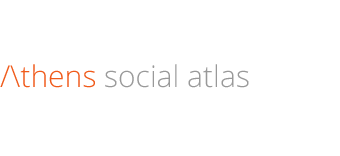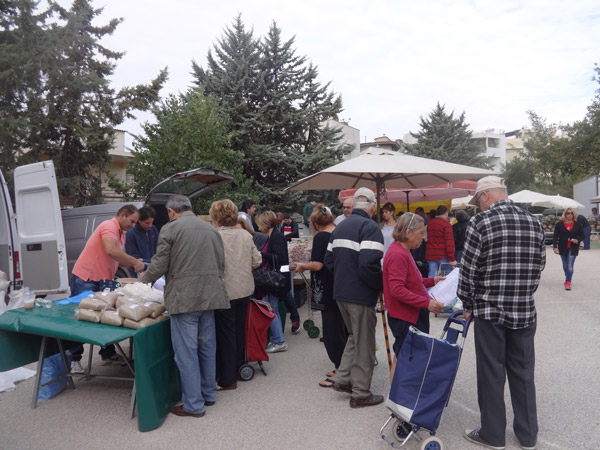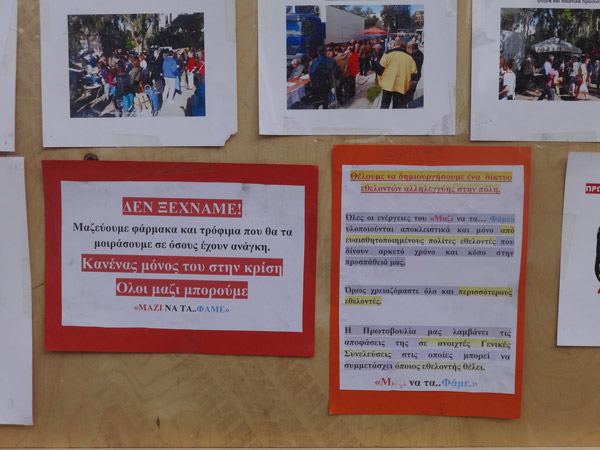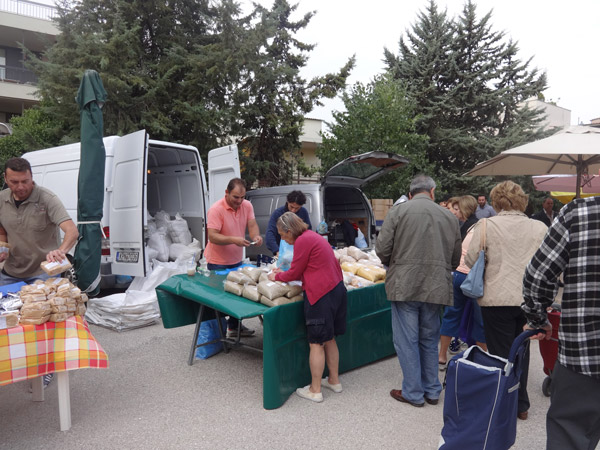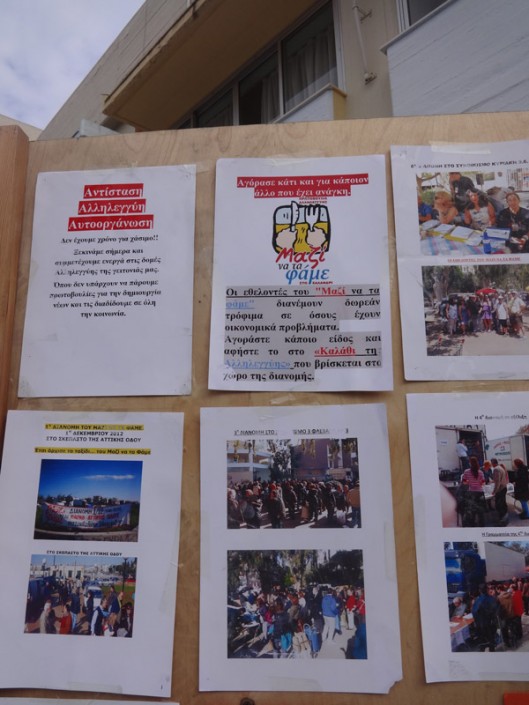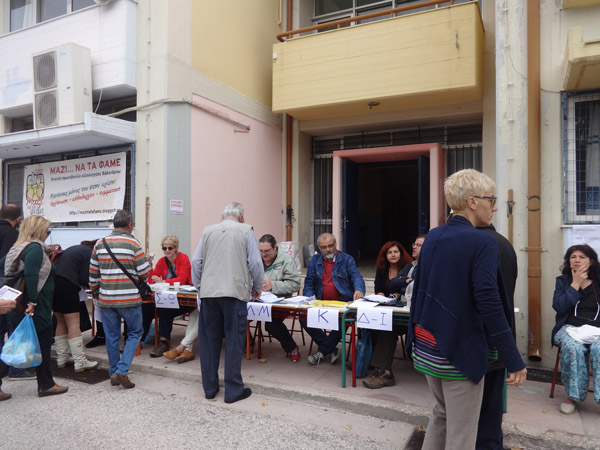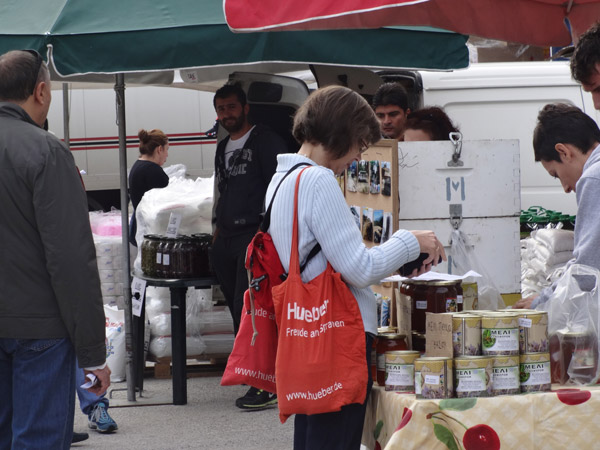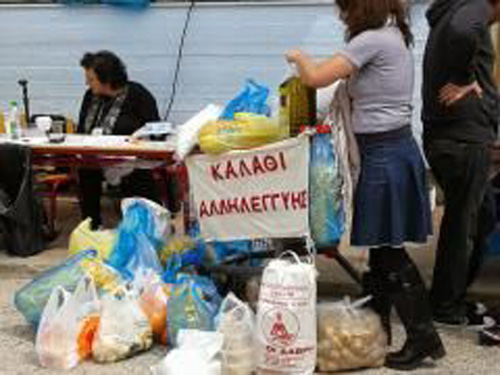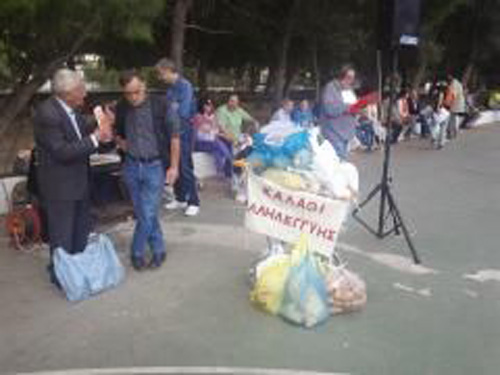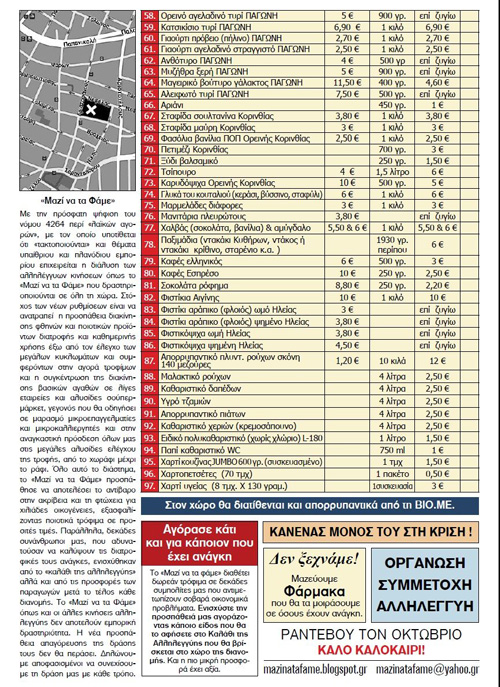"Let’s spend together". The "No Middlemen" citizen movement in the city
Petrou Michalis
Quartiers, Social economy
2015 | Dec
The “No middlemen” markets that have recently made a dynamic appearance in squares and open spaces in urban neighbourhoods are another form of Alternative Food Networks and of new city-countryside relationships. These informal markets bring farmers and small producers in direct contact with city consumers, bypassing all middlemen from the trade network in foodstuff and groceries. They are part of the social movements that emerged after the economic crisis in Greece, aiming at a solidarity-based, sustainable economy for the benefit of producers and consumers. The crisis has further highlighted the distortions along the agricultural product supply chain, through the involvement of dealers and intermediaries, who increase the final price of food. Furthermore, consumers do not know the exact origin of the food reaching their table (where and how it was produced, the methods it was processed by, the miles travelled from farm to shelf) and thus they often question its quality and nutritional value.
Therefore, in contrast to large agribusiness and retail networks, small trading networks not only restore the relationship of trust between producers and consumers, but also strengthen local economies where the products are produced. For city consumers, the benefit is not simply limited to buying “quality food with identity” at affordable prices, but also includes their active participation in citizen movements, the enhancement of social solidarity in the city, the support of small family farming and independent producers.
It all started with the so-called “potato movement” (2012), pioneered by the volunteer group of the Pieria District “My Land” [Ο τόπος μου], expressing a strong social demand for cheap food without commercial intermediaries. The first spark was lit and the “no middlemen” movement quickly spread to many cities in Greece, in response to the food needs of urban households that have been impoverished by the economic recession. In the greater metropolitan area of Athens, these alternative markets were spreading in squares, school courtyards, car parks and other open spaces. They were put in action in order to directly address the pressing food poverty problems of the population, through citizen group initiatives and neighbourhood collectives but in some cases also through municipal administration initiatives.
The “no middlemen” markets of the “resistance and solidarity movement” of Galatsi “Pairno Ampariza”, the solidarity network of the 6th Community of Athens “The ant”, the “bazaar” of the solidarity and culture movement of the citizens of Psychiko – Filothei “Oi Obrelles” and the no middlemen movement of the citizens of Halandri “Let’s spend together” and many more arrange their stalls on scheduled Sundays all year round. As noted by the members of the Galatsi collective:
| “We are exploring other methods for organising food distribution without middlemen of any type. We decide about the products we consume by ourselves. We support small Greek producers by providing them access to consumers. We cover our daily needs without focusing on profit. We respond to the dissolution of the social fabric with collectivity, social cohesion, mutual help and a cooperative spirit” (www.xmesazontes.gr). |
The organisation and operation of these markets is based on the voluntary action of citizens, while thoroughness and systematic preparation by the participants are key components for their successful outcome. Their success is evidenced by the increasing quantities of distributed products as the ‘no middlemen’ movement gains ground and consumers. A member of the General Meeting of the ‘no middlemen’ movement of the citizens of Halandri “Let’s spent together” notes:
| “The first distribution started in December 2012, when we already had 300 orders and distributed 11 tons of products. Two years later, orders have reached 1010 with37 tons of distributed products, while, from the 10 types of products we had in the beginning, we now have 90 different types, including oil, cheese, potatoes, honey, legumes, wine and nuts” |
The quality of the products and the consistency of producers are key aspects of the organisational process, designed to ensure consumer health and good service, as members of the movement make regular random checks. On the other hand, producers who are not committed to the scheduled meetings are excluded from the ‘no middlemen’ distribution network. Another member of the Halandri movement comments:
| “there was a case of a producer who cancelled his participation for the second time, just the day before the distribution, leaving several customer orders unfulfilled” |
Cases of unreliability however are rare, as producers do not want to jeopardise their relationship of trust with consumers, since their participation in “no middlemen” trade ensures them both the safe distribution for their products – in large quantities in fact – and savings from the middlemen’s profit.
Access to open trade areas is free and usually their appeal extents beyond the neighbourhood. The direct contact and meeting with producers, good product quality in combination with affordability, extroversion, vitality and social interaction through the parallel events often held (activities for children, musical events, lectures, book readings, collective kitchen, etc.) attract people from many parts of the region. This transforms open markets to hotspots for social interaction, political debate and festivity. One of the volunteers of the Halandri movement notes:
| “Consumers also come from further away, from Vyronas, Kalamaki… and they include people from all professional and social classes, engineers, professors…the unemployed,. However, they mainly include the former middle class, which is now gradually becoming the proletariat, although of course lower strata are represented as well. Therefore, the entire movement is supported not only by residents of Halandri but also by residents of other regions, who participate actively. Of course, there are also many who come purely for the money, just to find some cheap food… when your pocket is empty you don’t care too much for participatory organisations or for supporting local production” |
However, despite the popularity of the ‘no middlemen’ movement both for producers (ensuring new markets) and for consumers (access to quality food of identifiable origin, at affordable prices), it still remains in the realm of informal trade, as the State does not include it in the relevant institutional framework (Law 4264/2014 on engaging in commercial activities without shops, the organisation and operation of public markets and the conditions for authorising outdoor trade).
Along with the open market operating in a school at the Municipality of Halandri, there is also the “solidarity basket”, an initiative intended for households facing survival problems. This is an additional solidarity movement, where part of the products purchased by consumers and part of the production available by the producers is collected in baskets for families in need living in the Municipality. The reason behind this move was the malnutrition of children in local schools, which overturned the stereotypical perception that there is no poverty in the rich suburbs of Athens. As noted by members of the Halandri open solidarity initiative “Let’s spend together”:
| “The first indicator was children fainting in our schools. The teacher is the first to detect students who experience poverty problems at home. A student who does not bring a snack to school has a poverty problem, period. As we have teachers volunteering in the movement, we were immediately informed; people responded on a massive scale and we thus set up the basket scheme. Today, we distribute 70 baskets to households of the municipality and the trend is upward, while we are making efforts to identify other families too, as the sense of shame prevents many of them from contacting us. Our goal is to leave nobody on their own in this crisis and to resist” |
By the looks of it, alternative food networks emerging in recent years in the neighbourhoods of Athens are essentially based on collectives in the context of developing a “movement of volunteers and solidarity” against social disintegration, promoting a different path for popular organisation, large-scale participation and resistance to the crisis. On its website, “Let’s spend together” states:
| “Not only did we not spend public funds together (as famously claimed by a Greek politician), but more and more of us are finding it increasingly difficult to buy bare necessities. It is a key objective for us to achieve supply of cheap but quality food while promoting participatory forms of democratic self-organisation and solidarity on a permanent basis, organising product distributions on a regular basis” (http://mazinatafame.blogspot.gr/p/blog-page_328.html) |
Entry citation
Petrou, M. (2015) “Let’s spend together”. The “No Middlemen” citizen movement in the city, in Maloutas T., Spyrellis S. (eds) Athens Social Atlas. Digital compendium of texts and visual material. URL: https://www.athenssocialatlas.gr/en/article/no-middlemen/ , DOI: 10.17902/20971.4
Atlas citation
Maloutas T., Spyrellis S. (eds) (2015) Athens Social Atlas. Digital compendium of texts and visual material. URL: https://www.athenssocialatlas.gr/en/ , DOI: 10.17902/20971.9
References
- Renting H, Schermer M and Rossi A (2012) Building Food Democracy : Exploring Civic Food Networks and Newly Emerging Forms of Food Citizenship. International Journal of Sociology of Agriculture and Food 19(3): 289–307.
Online sources
Voluntary action team of the Pieria District: http://www.otoposmou.gr/
http://pernoampariza.wordpress.com/
http://mazinatafame.blogspot.gr/
